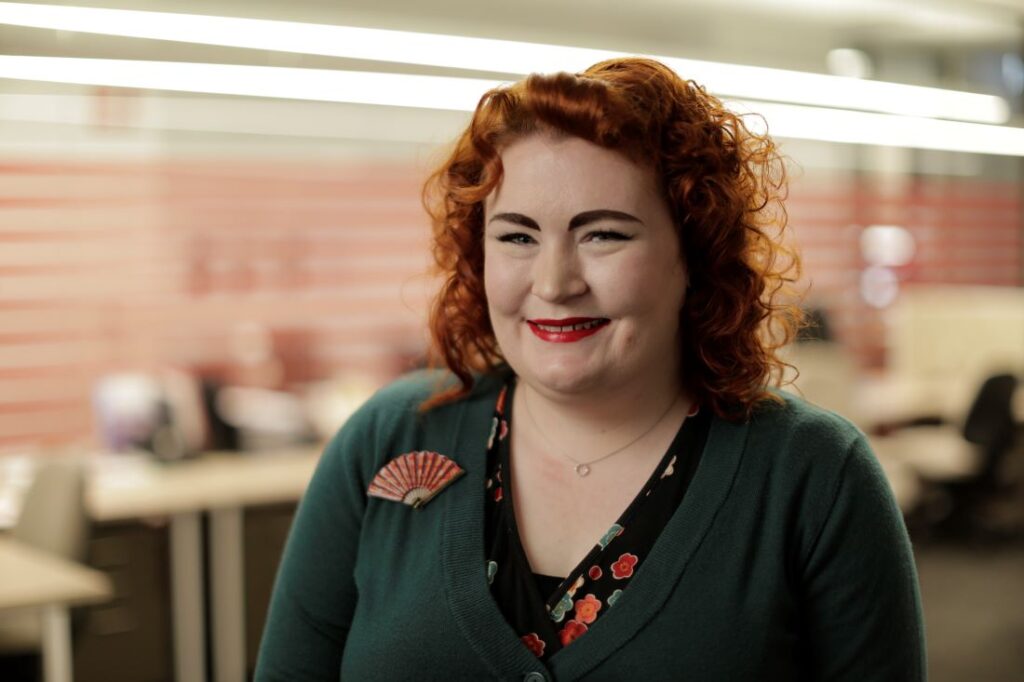
With the right planning and preparation, women with diabetes can “absolutely” have a healthy pregnancy and a healthy baby.
This positive message from Rachel Hicks (pictured above), comes as National Diabetes Week, (July 14-21), focuses on improving access to the life-saving technology people with diabetes need to live well.
Mrs Hicks, who was diagnosed with type 1 diabetes when she was five years old, said access to an insulin pump and a continuous glucose monitor had been life-changing for her.
“Having diabetes as a child and a teenager, you get a lot of pressure to just fit in,” she said.
“So, I was on manual injections for a very long time, and I was very against having an insulin pump for a long time as a kid.
“Encouragement from my team (at Macarthur Diabetes Service at Campbelltown Hospital) and being able to access an insulin pump through private health insurance, changed this when I was 17,’’ says the Southern Highlands mother of two.
“I was told the pump would really help me get my diabetes in the most ideal space for my circumstances.”
For women with diabetes, understanding and managing the risks of unplanned pregnancies, undertaking pre-pregnancy planning and maintaining glycaemic control before and throughout pregnancy can significantly increase the chance of having a healthy baby.
Having high glucose levels during pregnancy, increases the chance the baby may not develop properly. It also can increase the risk of loss or stillbirth.
Mrs Hicks said when she decided to start a family, she’d been lucky enough to be among the first patients to access the Diabetes Contraception and Pre-pregnancy Program (DCAPP) when it was introduced at Campbelltown Hospital.
She said she had understood before becoming pregnant there would be challenges, and her diabetes may cause complications which could have long-term effects for her and her baby.
But, at the same time she knew she could be prepared.
“What really made a difference for me was my treating team, in addition to the introduction of DCAPP thanks to Professor David Simmons.” she said.
“It was really great to have the treating team in Campbelltown. They used language which was empowering and at every appointment they’d emphasise something that I’d done well.”
DCAPP has been designed to develop a more integrated approach to supporting women of childbearing age with type 1 and type 2 diabetes.
Similar programs implemented elsewhere have reduced the rates of congenital malformations, miscarriage and stillbirths by up to 70 per cent.
South Western Sydney Primary Health Network is working in partnership with Western Sydney University and South Western Sydney Local Health District to implement the program in our region.
Mrs Hicks said it took a couple of years to get her diabetes in the space where she felt comfortable to be able to manage it and start trying for a baby.
Her pregnancy planning team included a diabetes educator, an endocrinologist and a GP, who worked collaboratively to improve her blood glucose management and put plans in place to prepare for extra low blood sugar levels, and ensure she had access to the most appropriate devices.
She said glucose monitors became more readily available around the time she was thinking about starting a family, with the introduction of a government subsidy.
“The glucose monitor removed a lot of the calculations and the decisions I’d have to make on a daily basis,” she said.
“Going through my first pregnancy there was so much more information to take on about what I needed to do for myself, for my baby, for my family during that time, so it was good to have a little bit of pressure relieved with access to a glucose monitor and getting more data on what was happening with my diabetes.
“My team helped me sign up for the glucose monitor subsidy and made sure I had all the tools I needed, even getting an updated ketones tester because I was still testing ketones manually.”
Mrs Hicks is also undertaking PhD research examining lived experiences of diabetes and pregnancy.
She said in addition to tailored support like she had received, women with diabetes planning pregnancy could also benefit from the good peer support communities which existed and hearing about the experiences of others.
If you have type 1 or type 2 diabetes and are thinking about having a baby, pre-pregnancy planning is vital.
Speak to your GP about how you can prepare your body for a healthy pregnancy.
Visit Health Resource Directory to find out more about pre-pregnancy planning for women with diabetes
